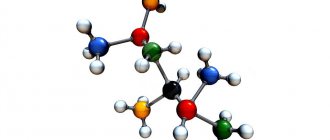Author: Timko Ilya - the ruler of the entire site and fitness trainer | more details >> Rod. 1984 Trained since 1999 Trained since 2007. Author and creator of the site tvoytrener.com. CCM in powerlifting. Champion of Russia and South Russia according to AWPC. Champion of the Krasnodar region according to IPF. 1st category in weightlifting. 2-time winner of the Krasnodar Territory championship in t/a. Author of more than 700 articles on fitness and amateur athletics. Author and co-author of 5 books.
Place in the ranking of authors:
out of competition
(become an author) Date: 2012-12-13 Views: 1,583,119 Rating: 5.0
| All articles by the author >> | Medals articles >> |
Articles are loading...
| Article medals: | article in TOP 50 | more than 1000 comments | more than 1 million views |
Why medals are given to articles:
| Bronze medal: | |
| 1. The article is in the TOP 100 2. The article has more than 3. The article has more than 100 | |
| Silver medal: | |
| 1. The article is in the TOP 50 2. The article has more than 3. The article has more than 500 | |
| Gold medal: | |
| 1. The article is in the TOP 10 2. The article has more than 1 3. The article has more than 1,000 | |
Protein is taken in two cases:
1. To gain muscle mass. 2. To maintain muscles while losing weight.
I am often asked: how much, how and when to drink protein? I’ll say right away that there are quite a lot of opinions on this matter. And I don’t think that my opinion is the only correct one. So let's get started.
How much protein is in protein
It is very important to understand how much protein is contained in protein. It’s worth noting right away that protein is protein itself. There are several types of foods and they all contain different amounts of protein. If you are interested in a specific brand, then you will find the most accurate information on its packaging. Typically, the protein concentrations of protein from different companies do not differ much.
Some types have protein levels as high as 90% and some as high as 70%. What does it mean? This means that 100 grams of protein contain between 70 and 90 grams of protein.
Features and types
Speaking about why protein is needed, it is worth noting that it is an important supplement for athletes who want to build muscle mass. This product is valued due to the fact that it contains a huge amount of protein - about 95%. The human body successfully uses this element to build muscles.
Protein is a source of amino acids that the human body constantly needs. If there is a protein deficiency, the body will begin to take it from the muscles. Thus, training to gain muscle may become useless.
Basically, protein is taken in the form of cocktails, which you can easily prepare yourself at home. As a rule, in addition to protein, such drinks contain milk, water or other additives to give a better taste. It is also allowed to add chopped berries, vegetables and fruits to cocktails. Before drinking a protein drink, you need to take into account that proteins are divided into several types, depending on the products on the basis of which they are made:
- egg;
- dairy;
- whey;
- soy;
- casein
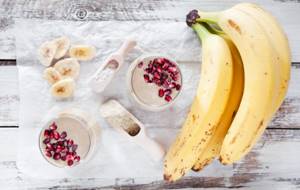
Depending on the rate of absorption, proteins can be slow or fast. Based on research, we can say that the rate at which the human body absorbs proteins will affect the rate of muscle growth. The sooner the protein is absorbed, the faster the muscles on the body will build.
How many times a day should you drink protein?
To figure out how much protein you need to drink daily, you need to consider your weight.
For example, let’s clarify the daily protein requirement for an athlete weighing 100 kilograms. His protein requirement is 250 grams per day.
This amount of sports nutrition should be consumed over several meals. It is necessary to divide 250 grams into 5 or 6 parts. This is done because the human body is not able to absorb more than 50 grams of protein at a time.
Protein is completely absorbed by the body within 1-1.5 hours. This means that after this time you can already drink a new portion of sports nutrition.
Knowing the protein norm for an athlete weighing 100 kilograms, it is not difficult to calculate your norm in proportions. How much protein is in a serving of protein? It is calculated individually, but for our example, a 50-gram serving of protein contains up to 40 grams of protein.

Results
Let's try to draw the right conclusions. Protein is necessary for every body and must be consumed regularly (this is beyond doubt). Another thing is that the ideal norm for yourself will have to be selected individually, based on the results obtained and internal sensations. In doing so, follow these tips:
- take only high-quality product;
- distribute supplement doses 6-8 times;
- the dosage at a time should not exceed 10-20 g;
- start with small portions.
How many days will a kilogram of protein last?
Of course, this indicator directly depends on how much protein you drink daily and what goals you are pursuing. On average, athletes consume about 2.2 grams of protein per 1 kilogram of weight. For an athlete weighing 100 kilograms who is gaining weight, 1 kilogram of protein will only last 4-5 days. If you consume protein as described above, you can achieve impressive results.
It's worth remembering that the protein found in protein is also found in the foods you eat every day. Consider your menu when calculating your daily protein intake. If you eat enough meat, fish, cottage cheese, eggs, then you will need significantly less protein, which means a kilogram of sports nutrition will last for a longer period.
You should not exceed the protein norm - this will not help you gain weight quickly; on the contrary, you will get problems with the liver and skin.
Below we will talk about what types of protein there are and how much protein they contain.
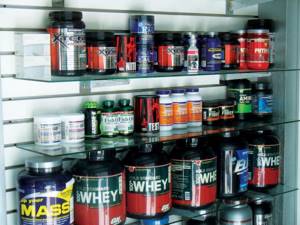
What's the mystery?
If everything is so simple, then why do athletes who take 2-3 g per kg of their weight gain muscle much faster. To calculate how much protein to take, it is important to take into account one more detail - the digestibility of the body. That is, each person takes protein with different effectiveness. For one it is enough to consume 1.5-2 g per kilo, while for another 2.5-3 grams is not enough. The body can absorb 40% or more of the resulting protein. However, this number differs for everyone. One can only guess how much the muscles will actually gain.
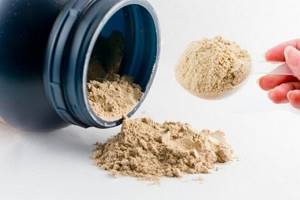
Whey Protein
The most popular and affordable type of protein is whey. How much protein is in whey protein? About 90% per 100 grams of product. This protein is of high quality and contains no fat or carbohydrates.
Drinking it is quite simple: mix the required amount of protein with water or any other liquid (juice, milk), mix with a blender. This drink should be drunk immediately after strength training to replenish amino acid reserves.
Whey protein is contraindicated in people with lactose intolerance.
Whey Protein Isolate
This type of protein is created by filtering milk protein. It can be used by those who want to lose weight and those who want to gain muscle mass. This type of sports nutrition is suitable for people who are lactose intolerant. How much protein is in whey protein isolate? To answer this question, it is necessary to consider three types of this product:
- hydrolyzate - quickly absorbed by the body, has a high cost, protein content per 100 grams is 90%;
- whey concentrate - quickly absorbed, low cost, protein content per 100 grams from 60 to 90%;
- isolate - quickly digested, contains more than 90% proteins per 100 grams of product, free of carbohydrates and fats.
The regimen for taking whey isolate is as follows:
- Those who engage in running, football and other outdoor sports should consume this protein 1 to 3 times a day.
- Those who want to lose weight should take protein in the morning, before and after training.
- Those who want to gain weight should consume whey protein immediately after training and in the morning.

The benefits and harms of protein
The benefits of protein
Almost everything in our body consists of proteins: organs, muscles, hair, nails, skin, brain. Protein is responsible for:
- Immunity. Antibodies that protect the body from infections are proteins.
- Building material for cells and tissues.
- Energy. 1 gram of protein yields 4 kcal, but they are used when carbohydrate reserves are depleted.
- Transportation. Hemoglobin, so important for athletes, is also a protein.
- Metabolism, hormonal and nervous regulation.
Protein harm
There are studies that indicate the dangers of a high-protein diet. Regular excess protein creates increased stress on the kidneys and liver, and there is a risk of dehydration. But all these side effects are associated with huge doses of protein (more than 5 g per 1 kg of body weight). When taking protein, like any other food, the usual rules apply: more does not mean better and everything needs moderation.
High doses of protein are no more harmful than high doses of fat or carbohydrates. All the horror stories about protein have no basis, especially the rumors about impotence. Meat, milk, cottage cheese, eggs do not scare anyone, but many are afraid of protein concentrate. Misconceptions about protein come from bodybuilding and strength sports, where, in addition to protein, prohibited drugs are often used. They do have serious side effects. Of course, no one advertises the use of these drugs, but ordinary people see a simple connection: I drank protein, built muscle, and paid for my health. Protein, like meat, milk and other protein products, on the contrary, has a positive effect on all processes in the body, including reproductive functions.

Source: Kelly Sikkema on Unsplash
Soy protein
It has low quality and, accordingly, low cost. How much protein is in protein per 100 grams? Soy protein contains 80 grams of protein per 100 grams of product. And this is the only advantage of such a protein.
Soy protein is slowly absorbed by the body, has low biological value, contains female sex hormones and is not the best choice in terms of sports nutrition.
If you have made your choice in favor of this protein, then it is better to consume it in the first half of the day and together with other, higher quality types of protein.
Egg protein
Egg white contains a large amount of amino acids and leucine. The protein also contains all the vitamins and nutrients found in eggs. This type of protein prevents the production of protein breakdown products.
Egg protein gives a long-lasting feeling of fullness, which helps in the future to eat much less food, and this is so important when losing weight.
100 grams of this protein contains 80% protein.
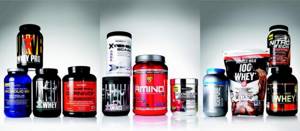
Getting protein from food
Of course, protein can be obtained not only from protein shakes, but also by consuming simple foods that contain large amounts of this element. Typically, these products include:
- eggs;
- fish;
- chicken breast;
- beef.
Of course, the products will not be absorbed so quickly by the human body, but they are no less useful than a protein shake. The only source of amino acids required by the body is considered to be natural protein, which is made from food.

Milk protein
Milk protein is a bit like whey protein. The only difference between them is the content of casein (the carbohydrate component) in the milk protein. Casein increases performance and endurance.
This type of protein is best for those who want to gain weight. Casein takes a long time to digest, but it is able to provide the body with the necessary amino acids for five hours.
It is recommended to drink this protein no more than three times a day: in the morning, after training and before bed. 100 grams of milk protein contains from 70 to 80% protein.
Regular food or sports drink?
Of course, natural, fresh food is always better. But there is NO NEED to use sports supplements INSTEAD of your usual food, there is no such task.
Sports nutritional supplements are just an aid, an addition to your main diet. If you have the opportunity to eat well and nutritiously, then you can do without sports nutritional supplements at all. Although, for example, vitamins will be useful in any case.
Unlike chemistry, sports supplements do not contain prohibited drugs, they are not doping agents and are approved to improve the nutrition of athletes. Because sports nutrition (sports nutrition) is just substances that provide the body with a large amount of proteins, carbohydrates, vitamins and other important elements.

DO NOT BE UPset if you do not have the opportunity to purchase, for example, protein - if you eat enough protein, then you absolutely do not need it.
Sports nutrition is not magic, it is not a guarantee of success, it is not a prerequisite for a beautiful body - it is an excellent assistant and improves results by 10-20%. Without a balanced diet and working hard in the gym, nothing will come of it; drink protein at least a hundred times a day.
And now we return to our sheep and our topic - protein.

